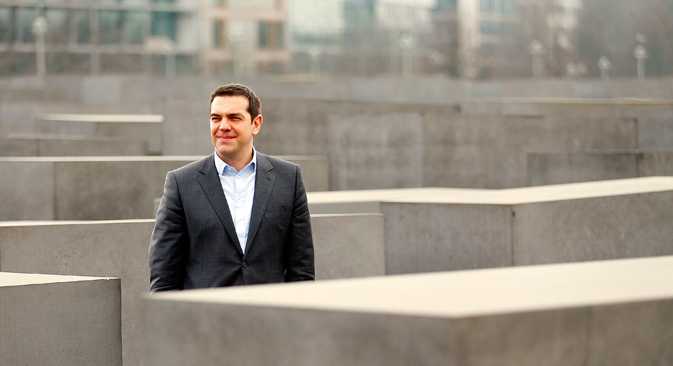
Greek Prime Minister Alexis Tsipras. Source: Reuters
The centrist daily Nezavisimaya Gazeta has run an article ahead of the visit of Greek Prime Minister Alexis Tsipras to Moscow, where he will meet with Russian President Vladimir Putin to discuss energy, investment, trade and tourism.
It is expected that Russia may make an exception for Greece by softening its food embargo for Athens, the newspaper writes. Many EU observers see this visit as almost a geopolitical shift, writes Nezavisimaya Gazeta.
Tsipras' forthcoming visit has caused a strong reaction, since the special position of Greece could really strike a dissonant note in the choir, explained Lyudmila Babynina, head of the Institute of Europe's Center of Political Integration at the Russian Academy of Sciences, in comments to the newspaper.
It primarily concerns Germany, which is extremely tough on the idea of any relief for Russia. Berlin fears a clear-cut, highly publicized split in the EU, and therefore does not want Athens to be bound by any obligations to Moscow.
"As far as the motives of Tsipras are concerned, his government has found itself in a very difficult situation and is being forced to seek non-standard solutions," said Babynina. "It is still unable to come to terms with the EU. If Greece asks for help, Russia will give it a loan, despite the difficult financial and economic situation. However, it may be a last resort, since Athens does not consider leaving the EU or eurozone to be in its interest."
The first meeting of the constitutional reform commission set up to carry out political reforms required to be implemented until the end of the year in Ukraine under the terms of the Minsk peace agreements has taken place in Kiev, the daily RBK reports.
According to the newspaper, the system of the distribution of powers between Kiev and the Ukrainian regions will change. "Decentralization will affect all levels of state governance, starting from the village and the city, which corresponds to Ukraine's commitments under the European Charter of Local Self-Government, but it will not affect either defense or foreign policy," an adviser to the constitutional committee and coordinator with the Democracy Reporting International, Andrei Kozlov, told RBK.
However, says Kozlov, separate regimes or a separate policy in the humanitarian sphere for some regions, such as the Donbass (in the east of the country), large tracts of which are currently under the control of Russian-backed rebels, are out of the question, since this would violate the principle of equality of rights.
Kiev insists that it will not negotiate with the representatives of the self-proclaimed Donetsk and Lugansk “people's republics,” in the Donbass, the newspaper points out. Work on the approval of amendments to the Ukrainian Constitution should be finished before the local elections scheduled for the fall.
The president of Turkey, Recep Tayyip Erdogan, is to become the first foreign leader to visit Tehran after the recent breakthrough in international negotiations on the Iranian nuclear program, the business daily Kommersant reports. The main topic of his meetings with the Iranian leadership will be a discount on gas: Energy procurement from Iran is a painful question for the Turkish authorities. According to the newspaper, Ankara expects to receive a discount of 25 percent.
The future of Iranian gas transit to Europe is just as important a question, the publication adds. The lifting of sanctions will allow Tehran to increase gas exports to Europe in the long term. Such a prospect would lead to an inevitable clash of interests between Russia and Iran, as well as to the strengthening of the position of Turkey, which aspires to the status of a key gas transit country in the region, Mikhail Krutikhin, a partner with RusEnergy, told Kommersant.
The EU could also consider the possibility of purchasing Iranian gas as a measure to reduce dependence on Russian fuel supplies, the newspaper writes.
All rights reserved by Rossiyskaya Gazeta.
Subscribe
to our newsletter!
Get the week's best stories straight to your inbox